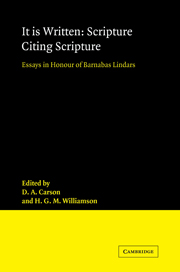Book contents
- Frontmatter
- Contents
- Preface
- Biographical note
- Abbreviations
- 1 An assessment of recent developments
- THE OLD TESTAMENT IN THE OLD TESTAMENT
- BETWEEN THE TESTAMENTS
- THE OLD TESTAMENT IN THE NEW TESTAMENT
- 11 Text form
- 12 Matthew
- 13 Mark
- 14 Luke/Acts
- 15 John and the Johannine Epistles
- 16 The Pauline literature
- 17 Hebrews
- 18 James, 1 and 2 Peter, Jude
- 19 Revelation
- Indexes
15 - John and the Johannine Epistles
Published online by Cambridge University Press: 16 January 2010
- Frontmatter
- Contents
- Preface
- Biographical note
- Abbreviations
- 1 An assessment of recent developments
- THE OLD TESTAMENT IN THE OLD TESTAMENT
- BETWEEN THE TESTAMENTS
- THE OLD TESTAMENT IN THE NEW TESTAMENT
- 11 Text form
- 12 Matthew
- 13 Mark
- 14 Luke/Acts
- 15 John and the Johannine Epistles
- 16 The Pauline literature
- 17 Hebrews
- 18 James, 1 and 2 Peter, Jude
- 19 Revelation
- Indexes
Summary
INTRODUCTION
Until fairly recently, John's use of the OT received relatively little attention. What little there was tended to serve other interests. For example, six decades ago Faure (1922) argued that the quotation formulae in this gospel provide evidence from which we may deduce the existence and extent of written sources used by the evangelist in the composition of his work – a suggestion vigorously contested by Smend (1925). The classic exchange between Dodd (1952), who argued that the NT writers understood the kerygma in terms of the OT, and largely respected the contexts of the various passages on which they tended to concentrate, and Sundberg (1959), who argued against these points, obviously had its importance for the study of the fourth gospel (FG). Apart from some notable exceptions, however, the study of John was largely shaped by other agendas. Debates focused on various source theories and on the intellectual matrix from which the FG sprang, the dominant hypotheses being represented by Bultmann (ET 1971), who insisted on the priority of Mandaean Gnosticism, and by Dodd (1953), who defended the influence of the Hermetica on the FG. The ‘notable exceptions’ included the commentary by Hoskyns and Davey (1940), the most important feature of which was the many lines drawn between the FG and the OT, the second volume of Braun (1964), and a seminal essay by Barrett (1947).
- Type
- Chapter
- Information
- It Is Written: Scripture Citing ScriptureEssays in Honour of Barnabas Lindars, SSF, pp. 245 - 264Publisher: Cambridge University PressPrint publication year: 1988
- 6
- Cited by



